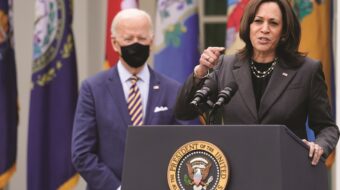
ORLANDO, Fla. — The anti-worker legislation pushed for the last 18 months by the Big Business-GOP cabal has a second common – but rarely discussed – theme: A disproportionate impact on women and minorities.
The $64 question in all that: What’s their motive? Anti-unionism (that’s obvious)? Racism? Sexism? Or all of the above?
“It’s both!” exclaimed an animated Arlene Holt Baker, the AFL-CIO’s Executive Vice President, in an interview with Press Associates Union News Service. “It’s racist, and it’s sexist, and it’s anti-unionist; it’s disproportionately against people of color.”
Holt Baker has led labor’s crusade against right-wing efforts to deny and deprive people of their voting rights in particular.
But the panoply of right-wing actions extends far beyond voting rights.
“Since January 2009, state and local governments have laid off 429,000 workers,” writes Stephen Pitts, of the Center for Labor Research and Education at the University of California at Berkeley. “Few commentators have examined the racial implications…This is an important question to address, because often policy prescriptions that, on the surface, are race-neutral can have decidedly racial impacts.”
“The public sector is the single most important source of employment for African-Americans,” Pitts added. “During 2008-2010, 21.2 percent of all Black workers are public employees, compared with 16.3 percent of non-Black workers. Both before and after the onset of the Great Recession, African-Americans were 30 percent more likely than other workers to be employed in the public sector.”
When states cut workers, African-Americans get disproportionately hurt. But it’s not just African-Americans who suffer from the GOP-pushed laws.
The so-called “Voter ID” laws restricting the right to vote, or even the right to register to vote, are expected to disenfranchise millions. Voting rights researchers say those who lose their rights will be those without state-issued IDs – and they’ll be disproportionately Black, other minorities and/or poor, plus the old and students.
Arizona’s notoriously anti-Hispanic SB 1070 criminalizes undocumented workers. So does Alabama’s even harsher law, which forced parents to pull kids out of school, workers to lose jobs and led citizen Hispanic families to flee the state in fear.
The postal reorganization bill by House Government Operations Committee Chairman Darrell Issa, R-Calif., would appoint a czar to run the financially troubled U.S. Postal Service, unchecked. The czar could tear up union contracts and fire workers at will. USPS itself wants to can 220,000 employees, half by attrition, and the other half by firing. The majority of Postal Service workers are minority-group members.
Issa’s measure is modeled on a Michigan law that lets the state take over local government bodies that are “financially failing.” The first governments to suffer such takeovers were the Detroit public schools and the cities of Flint and Benton Harbor. The workforces of all three are both unionized and majority-minority.
Michigan is moving towards banning collective bargaining rights for teachers. A huge share of school system workers nationwide are minorities and many teachers are Jewish. Most teachers are female, as are 62 percent of education support staff, according to a study by Professor Linda Johnsrud of the University of Hawaii.
Michigan also cut unemployment insurance from 26 weeks to 20. Its January statewide jobless rate was nine percent. But the rate in the Detroit metro area, which includes the majority-Black central city, was 9.8 percent. The workers get less jobless benefits now.
Ohio, Wisconsin, and other GOP-run states stripped collective bargaining rights for virtually all public workers, though a referendum overturned Ohio’s ban.
The day before the Ohio vote, AFSCME Secretary-Treasurer Lee Saunders said the Ohio ban “hurts people who work in public transportation, like my dad did for many years as a bus driver in Cleveland…Did you know in Ohio and around the country, one-fifth of all public-sector employees are African-American? That makes the public sector the largest employer of African-American workers in this nation.”
Gov. Chris Christie, R-N.J., got the legislature to trash pensions for 65,000 state workers, claiming he needed the money to close a state budget gap – an excuse used by other right-wing governors and legislatures for their own anti-worker moves. Most New Jersey victims, represented by the Communications Workers, are minorities.
The conclusion seems to be inescapable: There’s a second reason the cabal is driving all these laws through legislatures nationwide, besides anti-unionism.
Holt Baker also sees their schemes as an intense effort to hang onto power, especially against groups – unionists, women, and minorities – who challenge it.
“Their primary goal is to divide people from each other by any means necessary — racism, sexism, anti-unionism. It’s whatever they need to move their agenda,” she says.
Photo: Esthr // CC 2.0












Comments